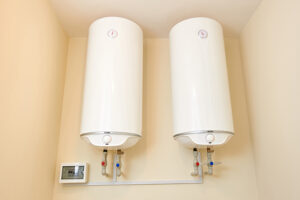Tankless Vs. Tank Water Heater: Pros and Cons
When lookin g for a reliable source of hot water in your home, you often have to choose between tankless and tank water heaters. Each model has its upsides and downsides. As a result, it’s hard to make a general statement on the best one for you.
g for a reliable source of hot water in your home, you often have to choose between tankless and tank water heaters. Each model has its upsides and downsides. As a result, it’s hard to make a general statement on the best one for you.
Do you live around the Burlington area? You can get a water heater replacement in Burlington from Davis Home Services. We’ll go over your preferences with you and help you make the right choice between these two water heater options.
To get you started, we’ll go over the pros and cons of each unit in this tankless vs. tank water heater article. You’ll soon have all the details you need to make the right decision for your home.
How Tankless Water Heaters Work
Tankless or on-demand water heaters heat your water only when you need it. This type of water heater can heat 2-5 gallons of water per minute using your fuel source. The unit will swing into action when anyone in your home opens a hot water faucet.
Pros
Some of the main advantages of tankless water heaters include the following:
Higher Energy Efficiency Rating
Tankless water heaters are more efficient than storage tank water heaters because there is no standby heat loss. That is, the unit will only work when necessary instead of heating water constantly, even when no one’s home. As a result, tankless water heaters are 8-34% more efficient than storage tank water heaters.
Longer Lifespan
Tankless water heaters can last for 20 years or more. Their durability makes them a good choice for commercial establishments.
Smaller Space Requirement
Tankless water heaters are smaller than their tank counterparts. For that reason, they can fit in tight spaces more easily. Their compact size makes tankless heaters a solid choice for smaller homes.
Cons
Some of the main drawbacks of tankless water heaters include the following:
Low Water Capacity
Central tankless water heaters can’t support hot water demand from multiple faucets around the home. This reduced capacity means that two people using separate bathrooms can’t get hot water simultaneously.
Higher Installation Costs
Whole-house tankless water heaters often cost more to install than storage tank water heaters. So, installing multiple point-of-use units to bypass this capacity problem can drive the cost up even further.
How Tank Water Heaters Work
Storage tank water heaters are the most common equipment for heating cold water in most properties. These units can hold 20-80 gallons of water in their reservoir. Once the tank is full, the unit will heat the water using the fuel source in your home.
These heaters run on propane, oil, or electricity. When someone turns on the hot water faucet anywhere in the home, the unit will release hot water from the top of the tank. When the tank is empty, the cold water mechanism will refill it from the bottom to ensure hot water is always available.
Pros
Some of the main advantages of tank water heaters include the following:
Simultaneous Use
With a reservoir of pre-heated water in place, the storage tank heaters can supply hot water to multiple faucets without any delays. This feature is one of the most cited benefits of storage tank water heaters in the tankless vs. tank water heater debate. For that reason, a storage heater is particularly useful for busy households.
Cheaper Installation Costs
Storage tank water heaters are generally cheaper to install. The size of the tank, fuel source supported, warranty, and brand name all influence the final price. However, these units are almost always cheaper than tankless heaters to install.
Cons
Some of the main disadvantages of tank water heaters include the following:
Lower Energy Efficiency Rating
Since tank water heaters constantly heat water in the reservoir, they contribute to standby heat loss. Standby heat loss refers to the amount of heat lost when the water heater is idle. Older storage tank water heaters contribute even more to this heat loss, which drives up energy costs.
Shorter Lifespan
Most tank water heaters need replacing after ten years, which is a fairly short lifespan. Some brands may push for replacement toward the 15-year mark, but rarely beyond that point. Though replacing your system’s anode rods can help extend your heater’s lifespan, your unit’s longevity ultimately depends on other variables.
More Demand for Space
The dimensions of the average tank water heater require you to have enough space to install one. As a result, you’ll end up losing some valuable square footage if you require a large water storage tank.
Which Should You Choose?
From our tankless vs. tank water heater discussion above, it’s easy to see that tankless water heaters just about win the battle. However, that doesn’t make them the perfect choice for everyone. For instance, it costs more to install a tankless heater vs. a storage tank model.
Similarly, if you live in a home requiring multiple simultaneous access to hot water, tank heaters will work better for you. You should choose a brand name heater with verifiable proof of longevity. Also, pay attention to the cost of replacing the anode rods and how frequently you should do so.
If your living situation doesn’t require simultaneous hot water access, tankless heaters are most likely the better option for you.
Get Expert Advice and Professional Water Heater Installation
At Davis Home Services, we have more than two decades of experience helping homeowners like you decide on the best water heater unit. If you’re still unsure about the best heater for you after our tankless vs. tank water heater analysis, we can help.
We’ll analyze your hot water needs and make a recommendation. With our industry-leading experience, we always pick the right water heater for our clients. Once we’ve chosen a unit for you, our team of licensed plumbers will complete the installation as quickly as possible.
You can learn more about water heater installations or call 844-226-9872 to discuss your needs and request an estimate.

